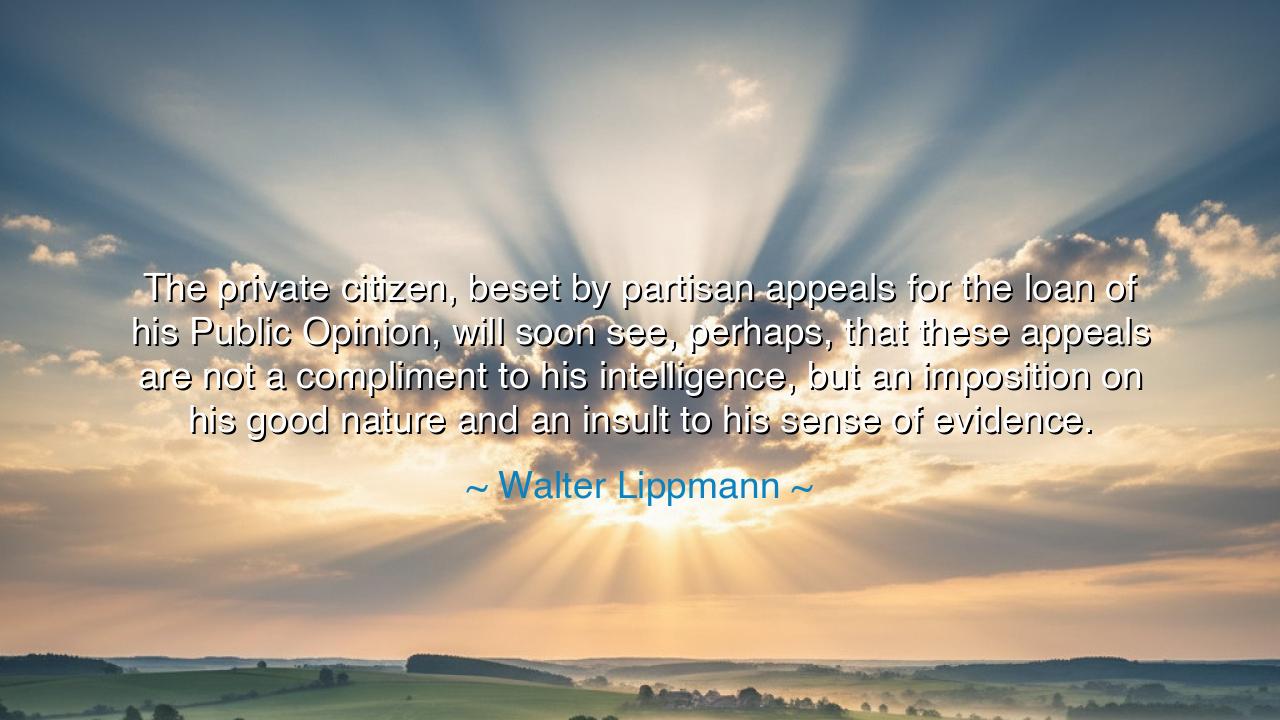
The private citizen, beset by partisan appeals for the loan of
The private citizen, beset by partisan appeals for the loan of his Public Opinion, will soon see, perhaps, that these appeals are not a compliment to his intelligence, but an imposition on his good nature and an insult to his sense of evidence.






The words of Walter Lippmann, wise observer of democracy’s hidden workings, strike like a warning bell across the ages: “The private citizen, beset by partisan appeals for the loan of his Public Opinion, will soon see, perhaps, that these appeals are not a compliment to his intelligence, but an imposition on his good nature and an insult to his sense of evidence.” In this utterance lies a timeless truth — that in the marketplace of ideas, not all voices seek enlightenment. Many seek obedience. The great battle of the modern soul is not fought with swords or fire, but with persuasion — the quiet war for the mind of the citizen.
In the age of Lippmann, the world had awakened to the power of propaganda. The printing press, the radio, the newspaper — these were the new altars at which public thought was shaped and sacrificed. Lippmann, who lived through the storms of the First World War and the rise of mass media, saw how political forces learned to bend Public Opinion like soft metal. To the private citizen, these appeals came cloaked as flattery — “Your voice matters,” “Your vote is sacred.” Yet beneath that praise lurked a cunning deceit: what they wanted was not his wisdom, but his consent. They wished him not to think, but to echo.
Lippmann’s words remind us that the true danger of partisan appeal is its subtlety. It flatters the heart while dulling the mind. It tells the citizen, “You are informed,” while feeding him only what will keep him loyal. And so, slowly, intelligence becomes entertainment, and judgment becomes allegiance. This is not the mark of a free people, but of a crowd — and the crowd, history teaches, is the easiest thing to control. In the heat of political passion, the love of truth grows cold.
Consider the tale of Socrates, who, in ancient Athens, stood before the might of public opinion itself. The people, swayed by demagogues, called him a corrupter of youth. They demanded his death. But Socrates did not yield to their fury; he spoke calmly, questioning their reasoning, appealing to their sense of evidence. Yet, blinded by pride and partisanship, the citizens chose emotion over truth. They killed him — and with him, a piece of their own wisdom. From that day, the Athenians learned what Lippmann would later warn: that when the citizen lends his judgment to the mob, he loses his freedom to think.
In our own age, though the tools have changed — from scrolls to screens — the peril remains the same. The citizen is surrounded by voices calling for his attention, his anger, his loyalty. Each says, “We speak for truth,” yet most speak for power. And so, he must learn to guard his mind as a fortress. To doubt is not weakness; it is the beginning of strength. To question is not rebellion; it is the first act of freedom. For the one who thinks clearly cannot be ruled by deceit.
The lesson of Lippmann’s wisdom is thus: do not give away your Public Opinion as if it were a favor to be lent. It is your birthright — the fruit of your reason, your reading, your reflection. Before you believe, examine. Before you agree, investigate. The voice that flatters you most sweetly may be the one that deceives you most deeply. Let evidence, not emotion, be your compass; let truth, not tribe, be your home.
And so, to the future generations who will hear these words: stand firm in the storm of persuasion. Be not seduced by slogans, nor carried by crowds. Think as the philosophers thought — slowly, deliberately, with love for truth above all else. Remember that intelligence is sacred, and evidence is your shield. For only when the private citizen reclaims his mind from the marketplace of partisanship will democracy breathe freely again — not as a spectacle of shouting voices, but as a fellowship of reasoning souls.






AAdministratorAdministrator
Welcome, honored guests. Please leave a comment, we will respond soon